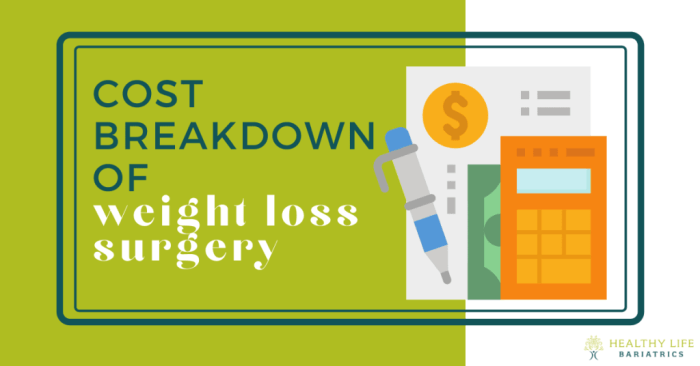How much does physicians weight loss cost? Understanding the price of physician-supervised weight loss programs is crucial for anyone considering this path to a healthier lifestyle. This guide delves into the multifaceted aspects of these programs, examining various factors that influence the final cost, from initial consultations to ongoing support and potential savings.
This comprehensive overview will help you navigate the financial landscape of weight loss programs, comparing different program types, examining cost variations across locations, and exploring potential financial assistance options. Whether you’re interested in medical weight loss or bariatric surgery consultations, this resource will provide valuable insights into the associated costs.
Factors Influencing Physician Weight Loss Costs

Physician-supervised weight loss programs offer a structured approach to achieving and maintaining a healthy weight under the guidance of medical professionals. However, the cost of these programs can vary significantly based on several factors. Understanding these factors allows individuals to make informed decisions about their weight management journey.Physician weight loss programs are not a one-size-fits-all solution; the costs reflect the tailored nature of care provided.
Factors such as physician experience, program duration, and the specific components included in the program significantly influence the overall price.
Physician Experience and Qualifications
Physician experience and qualifications are crucial determinants in weight loss program costs. Physicians with extensive experience in obesity management and advanced certifications often charge higher fees. Their in-depth knowledge and proven success rates contribute to the higher cost, often translating into more comprehensive and effective care. For instance, a board-certified bariatric surgeon with 15 years of experience in managing complex weight loss cases may command a higher fee compared to a general practitioner with less specialized training.
Location and Practice Type
Geographic location and the type of practice setting also play a role in determining costs. Areas with a higher cost of living generally have higher medical fees. For example, a weight loss program in a metropolitan area with a high concentration of specialty practices will likely have higher costs than a program in a rural community. Similarly, the type of practice (private practice, hospital-affiliated clinic, or a dedicated weight management center) can influence pricing.
Program Duration and Components
The duration of a physician-supervised weight loss program is a major factor in the total cost. Shorter programs, focusing on initial consultations and basic guidance, tend to be less expensive. Longer programs, encompassing ongoing support, advanced therapies, and personalized interventions, generally involve a higher financial commitment.
Program Components and Costs, How much does physicians weight loss cost
The specific components included in a weight loss program significantly affect its cost. This includes the frequency and duration of consultations with the physician, the inclusion of nutritional counseling sessions, and the potential for prescription medications. Let’s explore these components in more detail:
- Initial Consultation: This typically involves a comprehensive evaluation of the patient’s medical history, physical examination, and initial dietary assessment. This initial consultation is crucial for establishing a personalized weight loss plan and often sets the stage for the overall program.
- Nutritional Counseling Sessions: Nutritional counseling provides tailored guidance on healthy eating habits and meal planning. The number of sessions and the expertise of the dietitian or nutritionist will influence the overall cost.
- Prescription Medications (if applicable): Some weight loss programs may include prescription medications. The cost of these medications varies greatly depending on the specific drug and the dosage required. This is often a crucial part of the program and should be discussed with the physician.
- Lifestyle Modifications: These programs often emphasize lifestyle changes, including exercise routines. The cost of professional support or guidance in this area can vary significantly, depending on whether the program includes group sessions, personal trainers, or other support mechanisms.
Cost Breakdown Table
| Service | Estimated Cost Range | Factors Affecting Cost |
|---|---|---|
| Initial Consultation | $250 – $500 | Physician experience, location, program complexity |
| Nutritional Counseling Sessions (10 sessions) | $500 – $1500 | Dietitian/nutritionist experience, session duration |
| Prescription Medications (if applicable) | $50 – $500+ per month | Specific medication, dosage, insurance coverage |
| Lifestyle Modification Support (12 weeks) | $500 – $2000 | Program structure, frequency of sessions, support type |
Program Structure and Duration

Physician-supervised weight loss programs are designed to provide personalized guidance and support for achieving sustainable weight management. These programs are often structured to address the unique needs and challenges of physicians, recognizing the time constraints and specific demands of their profession. Understanding the program structure and duration is crucial for physicians considering such a program to ensure it aligns with their lifestyle and professional commitments.The structure of physician-supervised weight loss programs typically involves a combination of elements designed to promote long-term lifestyle changes.
Wondering about the price tag for physician-led weight loss programs? Well, the costs can vary quite a bit, depending on the specific program and the physician’s fees. If you’re looking for a new home in Abbeville, SC, you might find some lovely options at houses for sale abbeville sc. However, it’s best to contact the various programs directly for precise pricing information to ensure you find the right fit for your needs and budget.
Ultimately, finding the right weight loss solution is key, so be sure to do your research!
These elements often include personalized nutrition plans, regular exercise regimens, and ongoing behavioral modification strategies. The effectiveness of these programs is often amplified by ongoing support from healthcare professionals.
Thinking about how much physicians weight loss programs cost? Well, finding affordable options can be tricky, especially if you’re looking for a place to live. If you’re in Jersey City and need a place to stay, check out options for low income apartments here. Ultimately, the price for physician-led weight loss programs can vary greatly depending on the specific program and its features.
Hopefully, you can find a program that suits your needs and budget!
Common Program Structures
Physician-supervised weight loss programs often incorporate various components to cater to diverse needs and preferences. A typical program might include initial consultations to assess individual needs, create personalized plans, and establish realistic goals. Regular follow-up appointments with healthcare providers allow for adjustments to the plan, monitoring of progress, and addressing any challenges. Nutritional counseling sessions may be included to guide physicians in making healthy dietary choices.
Exercise recommendations, tailored to their physical capabilities and preferences, may also be incorporated.
Program Duration
The duration of physician-supervised weight loss programs varies based on individual needs and program specifics. Programs typically range from several months to a year or more. Factors such as the physician’s initial weight, desired weight loss, and adherence to the program will all influence the overall duration. Shorter programs might focus on foundational changes, while longer programs often involve more comprehensive lifestyle adjustments and support.
The average program might last for six months to a year, allowing for gradual changes and sustainable habits to develop.
Frequency of Sessions
The frequency of sessions or appointments within a physician-supervised weight loss program is critical for maintaining motivation and accountability. Initial sessions may be more frequent, allowing for the creation of a personalized plan and addressing any concerns. As the program progresses, the frequency of sessions might decrease, but regular check-ins are still crucial for monitoring progress, adapting the plan, and providing ongoing support.
Some programs might schedule weekly appointments in the initial phase, transitioning to bi-weekly or monthly sessions as the physician becomes more proficient in self-management.
Comparison of Program Types
Different program types may vary in their structure and duration. For example, programs focusing on rapid weight loss may have more frequent meetings in the initial phase to provide intense support and guidance, but may also incorporate longer-term follow-up to reinforce lifestyle changes. In contrast, programs emphasizing sustainable weight management may have a more gradual approach with less frequent but more in-depth sessions, focusing on long-term behavior modification.
Ultimately, the best program structure is tailored to the individual physician’s needs, preferences, and goals.
Illustrative Case Studies: How Much Does Physicians Weight Loss Cost
Understanding the financial aspects of physician weight loss programs is crucial for informed decision-making. This section presents a hypothetical scenario and a detailed cost breakdown for a sample program, providing a tangible example of the potential expenses involved. This allows readers to visualize the costs associated with various program components and personalize the cost projections to their own needs.A well-structured weight loss program for physicians should encompass a variety of services, tailored to individual needs and goals.
The program should be designed to support the physician through the entire process, from initial assessment to long-term maintenance. This section aims to clarify the cost structure of such a program, making the process more transparent and manageable.
Sample Physician Weight Loss Program
This illustrative case study Artikels a hypothetical weight loss program tailored to Dr. Emily Carter, a busy cardiologist. Dr. Carter seeks a program combining personalized dietary guidance, regular exercise recommendations, and ongoing support.
| Service | Cost |
|---|---|
| Initial Consultation (Comprehensive medical history, dietary assessment, exercise evaluation, goal setting, and personalized plan): | $500 |
| Follow-up Appointments (4 sessions over 3 months, focused on progress tracking, adjustments to the plan, and motivational support): | $1,000 |
| Nutritional Counseling (3 months of weekly sessions, emphasizing healthy meal planning and portion control): | $1,200 |
| Exercise Physiology Consultation (2 sessions to develop an exercise plan tailored to her schedule and preferences): | $400 |
| Ongoing Support (monthly check-ins via phone or video calls, providing motivation and accountability): | $300 |
| Total Program Cost: | $3,400 |
This program’s cost breakdown reflects a moderate level of intensity and support. Factors such as the frequency of appointments, the duration of the program, and the specific services included will significantly impact the overall cost. Physicians seeking a more intensive or extended program may expect higher costs.
Closing Summary
In conclusion, the cost of physician-supervised weight loss programs is influenced by numerous factors, including the type of program, physician experience, location, and duration. While initial costs can vary significantly, exploring potential savings through financial assistance and insurance coverage can significantly impact the overall expense. This detailed analysis empowers you to make informed decisions about your weight loss journey, enabling you to choose a program that aligns with your budget and health goals.
Expert Answers
How long do physician-supervised weight loss programs typically last?
Program duration varies depending on the chosen program type and individual needs, ranging from a few weeks to several months. The frequency of sessions and the total duration of the program are typically Artikeld in the program details.
What types of insurance coverage are typically available for weight loss services?
Insurance coverage for weight loss services can vary greatly depending on the specific plan. Some plans may cover consultations, medications, or nutritional counseling, while others may not. It’s recommended to contact your insurance provider to determine the extent of coverage for weight loss services.
Are there any potential savings for patients who are members of a health club or wellness center?
Some health clubs and wellness centers offer discounted or bundled packages that may include physician-supervised weight loss programs. Checking with local facilities is often worthwhile to explore possible discounts.
